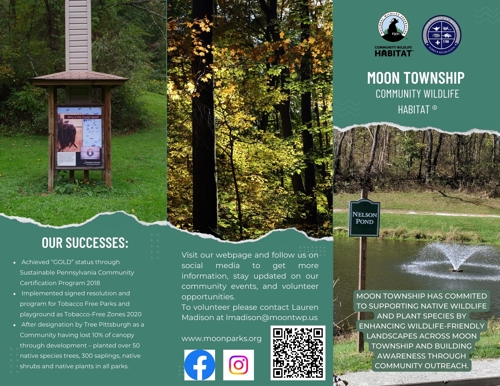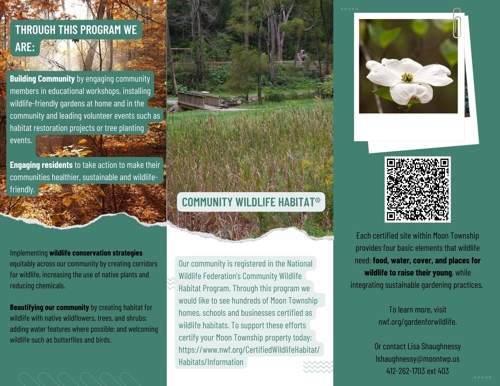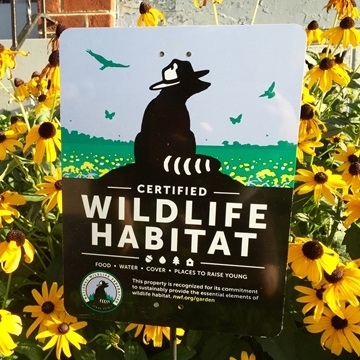Moon Township, March 17. 2023 – The community of Moon Township is launching a new partnership with the National Wildlife Federation’s Community Wildlife Habitat™ program to become a healthier, greener, and more wildlife-friendly by committing to create wildlife habitat throughout its communities while also educating and engaging residents.
Healthy habitats and healthy communities go hand-in-hand. Too often communities are suffering from pollution, disinvestment, or other challenges that separate people from the natural world. When human communities suffer, wildlife suffer as well.
“By joining the National Wildlife Federation’s Community Wildlife Habitat program, Moon Township is sending a clear and powerful message to communities all over America that people working together can create healthy habitats and healthy communities and make a difference in their own community and beyond,” said Patrick Fitzgerald, Senior Director of Community Wildlife.
Moon Township is taking steps to meet the requirements to achieve this certification in areas of outreach, education, and more. Residents of Moon Township can help by certifying their own gardens and yards through the Certified Wildlife Habitat program. Schools, businesses, churches, and HOAs are encouraged to participate in this exciting venture as well. Each residence and organization that is certified will help the Township reach its goal. Additionally, the Moon Township Environmental Advisory Counil is encouraging residents to join the Pollinator Pathways program. Moon Township’s efforts with pollinators and the Community Wildlife Habitat program will work hand in hand preserve and enhance the green spaces of our community.
“We are excited to start this certification process,” says Lisa Shaughnessy, Youth Program Coordinator for Moon Parks and Recreation. “We have already begun projects in some of our parks, like converting lawn areas to meadows with native plants, as well as nature programming for ages 3-12 and our annual Earth Day event. All these efforts will be essential to reach Community Wildlife Certification, which we hope to complete in 1-2 years.”
Since 1973, the National Wildlife Federation has provided millions of people with the basic guidelines for making their landscapes more hospitable for wildlife. To date, through the Certified Wildlife Habitat™ program, the National Wildlife Federation has certified more than 250,000 sites including yards, schools, businesses, community gardens, parks, and places of worship. Each of these sites provides the four basic elements that all wildlife need to thrive: food, water, cover and places to raise young, while integrating sustainable gardening and landscaping practices.
To become certified as a National Wildlife Federation Community Wildlife Habitat™ Moon Township is calling on its residents to certify their own property at
NWF.org/Certify and join our education and outreach efforts to learn about how residents can create a healthier, greener and more wildlife-friendly community.


 Pollinator Pathway Project
Pollinator Pathway Project
"In the past, we have asked one thing of our gardens: that they be pretty. Now they have to support life, sequester carbon, feed pollinators and manage water."
-Doug Tallamy
A stranger coming to Moon Township would have many options for getting here safely and finding a home, but what about a beautiful Monarch butterfly or migrating bird? Could either one travel here safely? If they wanted to stay here and raise a family, would there be room for them? Does it matter if they can live here or not?
Our parks and conserved lands, no matter how grand in scale, are too small and separated from one another to adequately preserve the native trees, animals, insects and animals that our ecosystems depend upon to survive and thrive. Humans depend on these ecosystems for their survival.
We are at a critical point where we are losing so many native plant and animal species that the ecosystem services we rely upon (oxygen, clean water, flood control, pollination, pest control, etc.) are becoming seriously compromised. However, if many people make small changes, we can restore healthy ecological networks and weather the challenges ahead.
The Moon Township Environmental Advisory Council, in collaboration with the Moon Garden Club, The Hollow Oak Land Trust, Moon Parks, the Girl Scouts, the Montour Run Watershed Association and others, is working to create a Pollinator Pathway for wildlife. Pollinators drive energy up the food chain. They provide almost all food for baby birds and help plants reproduce. 35% of our food is produced because of the work they do.
We need individual property owners to help link our fragmented natural areas into a mosaic that pollinators and other wildlife can use. No matter if it’s a container planting or a large forested area or meadow, each piece of the pathway is very important to the animals who share our home.
There are 4 key components to the Pollinator Pathway:
Plant native plants, especially Keystone plants. These can be trees, shrubs, perennials or annuals. Try to provide nectar sources for Spring, Summer and Fall. In fact, if you are going to do just one thing, planting an oak tree will have the largest impact. It supports over 500 species of caterpillars!
Avoid the use of pesticides and herbicides which will kill pollinators and damage the soil. Seek organic alternatives that do the least harm.
Remove invasive plants over time. Invasive plants like garlic mustard and knotweed are like tumors that crowd out native plants that our pollinators need. Start removing the ornamentals you now have that are known to be invasive species. Learn more about invasive species at invasivespecies.gov
Rethink your lawn. Lawns are ecological deserts. Think, muse, strategize about how you might reduce the area that is now lawn. Maybe start by planting a very small area (perhaps a mini meadow), leaving enough green grass for your paths and recreational use. It doesn't matter how small or how large your plantings are; what's most important is that you get started. Plant that oak tree. Build a bed around it and leave the leaf litter. BOOM! Powerhouse tree and less lawn!
Get on the map!
Go to pollinator-pathway.org and add your property to the pathway.
Help Moon Township become a Certified Wildlife Habitat by certifying your Moon Township property at nwf.org/CertifiedWildlifeHabitat/Habitats/Information
For more information on Moon Township’s Pollinator Pathway contact:
Judy Mihok – Moon Environmental Advisory Council
412.600.0495
Moontownshippollinatorpathway@gmail.com
For information about the Community Wildlife Habitat contact:
Lisa Shaughnessy- Moon Parks
lshaughnessy@moontwp.us
412.262.1703 Ext. 403


